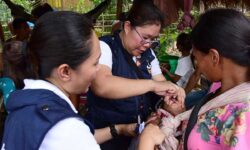
Only 32% of Infants in Davao Received Penta 1
THE Davao City Health Office (CHO) announced that they are awaiting the delivery of pentavalent vaccines from the national government, following a shortage that began in June 2024.
Dr. Julinda Acosta, chief of the CHO Technical Division, shared in a media interview on Tuesday, September 18, 2024, at the Apo View Hotel, that they expect the supply to arrive by October.
“Hopefully karung Oktubre muabot na ang atoang Penta. Actually nagkaroon tayo ng shortage sa Penta dili lang sa Pilipinas even sa globally pero karung October mag-abot atoang penta vaccine (Hopefully, this October the Penta vaccines will arrive. We’ve experienced a shortage not only in the Philippines but globally. However, we are anticipating the arrival of the vaccines this October)” she said.
She added that other vaccines are available at their office, and personnel have been instructed to continue administering them to children. Acosta also noted that the shortage has led to a decrease in the number of children receiving the first dose of the Penta vaccine (Penta 1).
“Ni kunhod atoang Penta 1 kay nahutdan gyud ta ug vaccine since June, July, August, September, mag four months na po na wala tayong Penta (The number of children receiving Penta 1 has decreased because we have been out of stock since June. It’s been four months without the Penta vaccine),” she said.
Acosta also said that once the vaccines arrive, the CHO will launch a large catch-up vaccination campaign to ensure children who missed their doses can be immunized.
The CHO underscored that only the pentavalent vaccine is in short supply, while all other vaccines remain available at healthcare centers.
CHO data shows that, among the eligible population of children aged zero to 11 months, only 12,092, or 32.7 percent, have received the Penta 1 dose. Additionally, the immunization rate in Davao City has steadily decreased, from 62.9 percent in 2022 to 65.4 percent in 2023, and only 28 percent as of September 2024.
In response, the local government is intensifying strategic vaccination efforts at fixed sites, including schools, malls, hotels, parks, and through mobile and door-to-door campaigns.
According to the World Health Organization (WHO), the pentavalent vaccine protects against diseases such as diphtheria, tetanus, pertussis, Hib, and hepatitis B, significantly reducing health risks for immunized children. RGP



